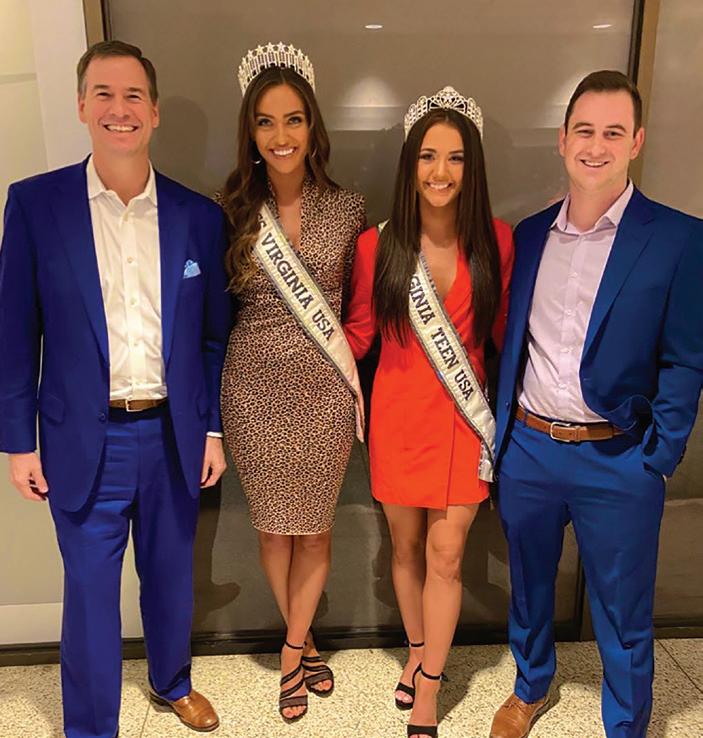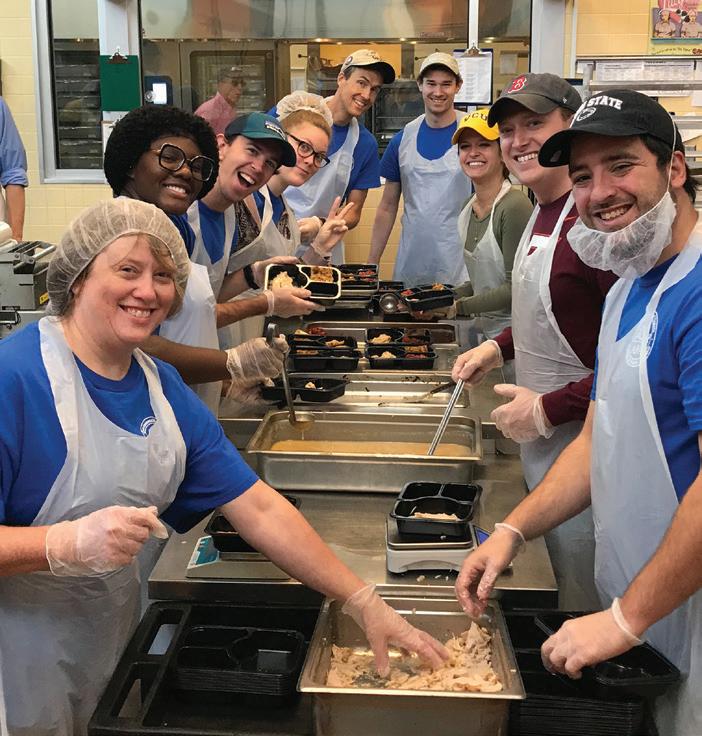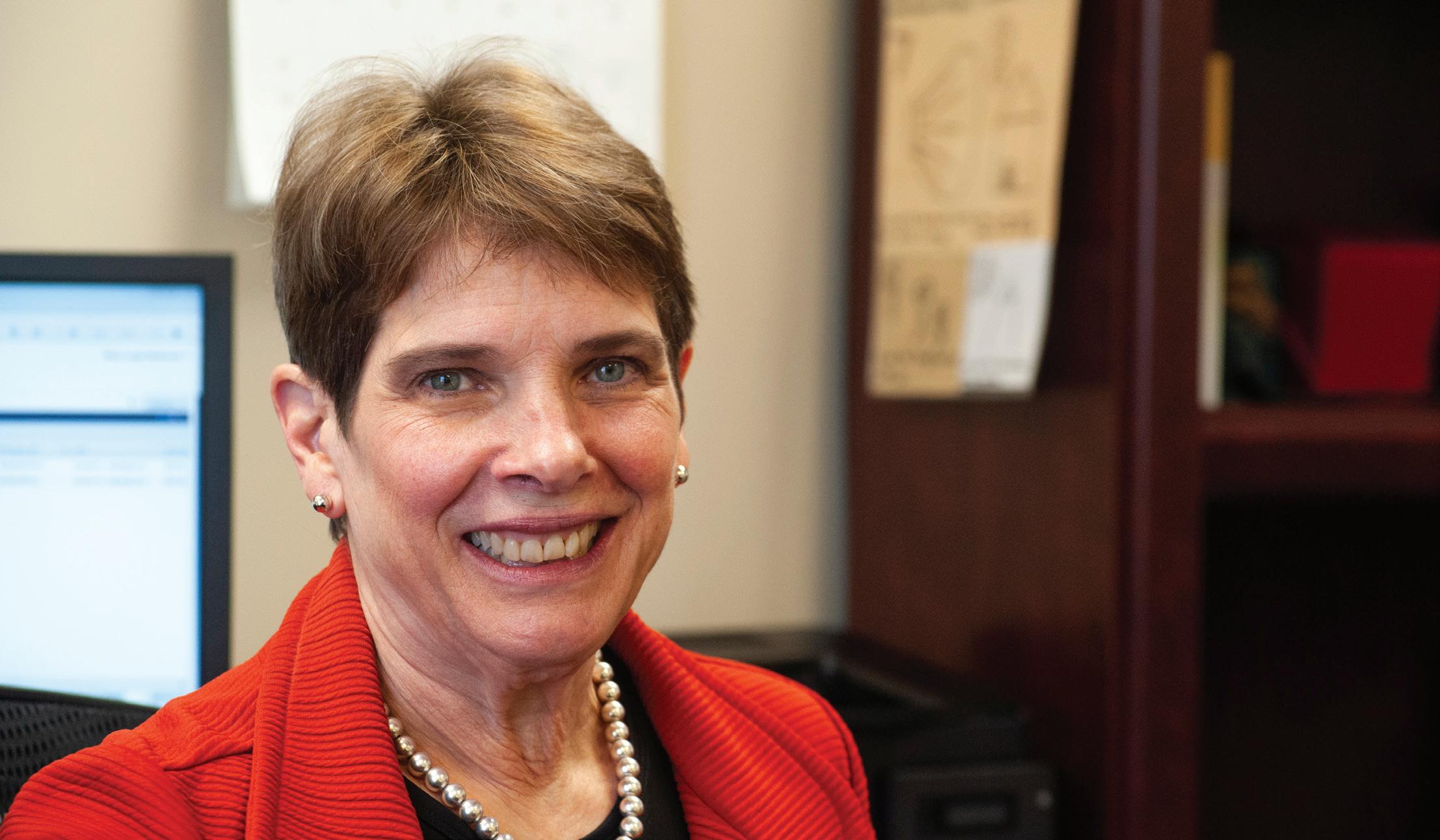
20 minute read
Tactical responses to the ACA
Sole practitioners and small groups can take aim at health care costs with some insurance options currently available in Virginia.
Brian Marks, CEBS
Advertisement
The Affordable Care Act (ACA) is at its 10-year milestone; it was signed into law on March 23, 2010. Its intent was to improve access to health insurance and health care while enhancing affordability. The focus of many of its reforms was individual market access; however, its impact has been far-reaching to all market segments of health insurance delivery. Though frequently called health care reform, the net effect of the law’s passage was to change health insurance, with little or no positive impact to reducing overall health care costs. Most notably, the reform of individual and small group underwriting created many unintended consequences, and subsequent winners and losers.
CURRENT POLITICAL CLIMATE OF THE ACA
Since its passage and enactment, the ACA has been a center point of political debate. Each constituency argues it either went too far or not far enough. All in all, after many attempts to change the key and most impactful elements of the ACA, it still remains fundamentally intact.
The most notable recent change was the removal of the individual mandate tax. The individual mandate required all Americans to have health insurance coverage or pay a tax, and it was removed as part of the Tax Cuts and Jobs Act of 2017. The removal of this tax has thrown the entire ACA into the courts to question its constitutionality. The basis for the argument of unconstitutionality is that without the tax, the ACA violates the Constitution’s Commerce Clause. At present, portions of the law have been deemed unconstitutional by a Texas District Court. On appeal, the 5th Circuit Court concurred and has returned the case to the lower court to determine which, if any, portions of the ACA could stand without the individual mandate tax. The net effect is the case will likely come before the Supreme Court again in the future. There was a request of the Supreme Court for an expedited review from the House of Representatives and a collection of Democratic Attorneys General that would have sped up the Court’s review. That request was denied by the Court.
On the legislative side, the often-delayed Cadillac Tax, which would have charged an excise tax of 40 percent on higher-cost plans, has been repealed along with the Health Insurers Tax (HIT), which added roughly 3 percent to the cost of fully insured plans. The HIT has been on and off again in recent years and will be removed permanently in 2021. In addition, the relatively small Medical Device Tax was also repealed. Lastly, the most recent legislation also revived the Patient Centered Outcomes Research Institute (PCORI) fees, which were set to expire in 2019.
IT IS WHAT IT IS. NOW WHAT?
It is difficult to not be distracted by all the factors that impact the health insurance markets in the postACA era. There is a continual barrage of legislation, court cases and bold new proposals of variations of government options, including a single-payer system. However, the continual “what next” leaves many paralyzed into inaction and/or generally confused a great deal of the time. It is my advice to deal with everything where it stands at the moment and do not attempt to predict the constant “what next.”
Some changes in recent years do bring some relief to certain individuals and smaller groups, which are the market segments most affected by the ACA’s provisions. Here are some courses of action for those constituents.
SOLE PROPRIETORSHIPS AND VERY SMALL GROUPS
In 2018, Virginia SB 672 expanded the definition of a small group in Virginia to include sole proprietors. The intent of the law was to provide sole proprietors, many whom could not receive an ACA subsidy, an option to the ACA’s individual market. I believe most would agree that absent a subsidy, these plans had higher rates and less attractive benefits than comparable small group plans. In addition, individual plans typically have smaller networks and more restrictive managed care principles, smaller prescription formularies, referral requirements, etc., than most small group plans. To be eligible to purchase a small group plan as a sole proprietor, certain criteria must be met:
1. They must be the sole, 100 percent owner
2. They can have no other employees, including permanent part-timers
3. They must have the appropriate tax documents from the preceding tax year. Carriers typically request a Schedule C. u
If all the aforementioned criteria are met, then the entity can implement a small group policy with just the owner and their family covered.
LLCs
SB 672 did much to help certain sole practitioners. However, it still left ineligible for coverage many LLCs that had multiple partners, yet no employees. The definition of an employee was again expanded in 2019 for small employers in the Virginia Code. The law now recognizes LLC owners as employees for the purpose of health insurance. Now an LLC with two or more owners, related or otherwise, and no other employees may purchase a small group plan.
These changes have greatly enhanced the health insurance options and solutions for many small businesses in Virginia. One thing to keep in mind, whether searching for options for your organization, or advising clients, is to seek expert help. I receive many calls where a business owner incorrectly assumes that they cannot obtain a plan if it is only needed for just one employee or the owner themselves. Many times, small group options are available, but the business owner has been advised incorrectly that these options were nonexistent. Group plans can be implemented in most instances — as long as the employees who will waive the plan are covered on other health insurance. We have many clients with just one employee enrolled out of several.
SMALL GROUP SELF-INSURANCE
The ACA negatively impacted rates for small groups with fewer than 50 employees and demographics more favorable than the normative average of the pool; that is, younger in age and/or lower in risk factors. To alleviate the negative impact of the ACA’s underwriting changes, of smaller variance in age spread of 3-to-1 for the rates of the youngest to oldest and no medical
28 DISCLOSURES • MARCH/APRIL 2020 underwriting, many carriers began to self-insure smaller clients. This approach allows an insurer to base their rates on an organization’s demographics and medical risk factors. Employers with favorable demographics can take advantage of rates lower than fully insured ACA rates. I had several clients this year who have reduced their health insurance rates by 25 percent or more while maintaining benefit comparability utilizing this strategy.
Small group self-insurance is typically available for groups with 10–50 employees. However, there are exceptions above and below these parameters for a few carriers. Procedurally, it is fairly easy to obtain final rates for employers with more than 25 employees. Most carriers will provide firm rates with a memberlevel census, which lists all employees and their dependents by zip code, and a risk form from the group noting known medical conditions. Of course, due to HIPAA Privacy Regulations most employers should know very little. Generally, organizations with fewer than 25 eligible employees will be required to complete individual medical questionnaires, which allow the carrier to assess the medical risk of a group. This process is more disruptive than the simplified underwriting available to larger groups.
If you choose to evaluate this option and individual medical applications are required, I would suggest utilizing an online tool to capture the information or having the employees place their paper applications in a sealed envelope to be delivered to the employee benefit advisor directly. I believe it is unwise to have medical information on your employees in your organization, or have others know the medical conditions which may exist in a small organization. It can generate many privacy issues surrounding someone knowing anything about the medical conditions of an employee and/or their family members. I would also suggest a universal medical form be used, if possible, so rates can be gathered
from as many carriers as feasible. If your organization has less than 25 employees, you may still be able to obtain a quote from your existing carrier with no medical risk forms submitted. This is possible since the existing carrier has all information on the insured population in their claim system. Many times, carriers will proactively release a self-insured option when they determine a group is a good candidate. Our organization reminds the carrier to evaluate this at each renewal.
Small group self-insurance has all the same components as large group self-insurance; medical claims, administrative fees, specific stop-loss reinsurance for claims on an individual and aggregate reinsurance for protection of the entire group. Most carriers have simplified this a bit for small employers and essentially charge an employer a maximum rate. This rate includes all components: claims, administrative fees, reinsurances, claim run out, etc. The employer’s liability with small group self-insurance is limited to the maximum rates the carrier charges. If the claims are worse than a carrier projects, they do not recoup anything beyond the maximum rates charged. However, if the claims level is lower than the carrier projects, there may be some refund of payments to the employer. The level of refund can vary by carrier, and even within options of a carrier. My experience is most return 50 percent of the savings to a group that has lower claims than their projections. Given the variability in claims for small clients, I advise them not to have any expectation of a refund. In my opinion, this approach should be viewed as a way to procure rates that are better than those available under the ACA.
If you do evaluate small group self-insurance, there are things of which you should be aware and questions you should ask to be sure you understand the arrangement. Key questions include:
1. Is my liability capped? You want to ensure that the liability is indeed capped, and this is usually not an issue under standard arrangements with the major carriers like Aetna, Anthem, Cigna, Optima, UnitedHealthcare, etc. However, there are options available from many thirdparty administrators in the market as well. These can be fine alternatives, but you need to be sure your liability is capped and there is no unexpected claim run out liability.
2. Who does the reporting? As a self-insured employer, you are responsible for U.S. Internal Revenue Service (IRS) Section 6055 ACA reporting. For small group selfinsured plans, this is a 1094-B transmittal to the IRS and a 1095-B to the employees. In addition to 6055 reporting, self-funded employers must remit their own PCORI fees. You should be aware who is responsible for this reporting under any self-insured arrangement since carriers can vary in their approach to this component.
3. What happens if I cancel the plan off of my renewal cycle? You should make certain this is allowable. It has been my experience that this is usually an option, but you want to make sure — particularly if you are considering a business sale.
DO WHAT YOU CAN TODAY
The ACA has had a major impact on health insurance delivery since its inception 10 years ago. Its impact on individuals and organizations has varied based upon one’s own situation. As the implementation of the law continues to progress, I anticipate more changes and challenges. My advice has remained constant since the inception of the ACA:
1. Move forward with what you know to be the case today. Predicting the future is not possible.
2. Fully analyze your situation to maximize your positioning relative to the ACA and the insurance markets.
3. Do not go it alone. Get good advisory help from someone who understands the options.
Remaining informed on developments is key and staying on top of the various available solutions is imperative. Organizations will continue to look to their CPAs to help navigate this increasingly complex and ever-changing environment. CPAs can assist by assembling a solid advisory team to help their organizations or those of their clients. By being an integral part of the process the value you deliver to your clients or organizations can be greatly enhanced. n
Brain Marks, CEBS, is founder and president of Employee Benefits of Virginia in Glen Allen. He has more than 25 years of experience in employee benefits, 15 of which have been devoted to managing the employee benefits programs of the VSCPA.
bmarks@ebova.com
Employee Benefits of Virginia is a preferred provider of the VSCPA.
How Virginia CPAs give back


CST Group in Reston supported the Cornerstones Thanksgiving Food Drive last November by donating 11 boxes of food and 27 gift cards.
Glen Allen-based Keiter donated $11,000 to Richmond-area nonprofits as part of its year-long “A Bright Future Serving the Community” campaign. Organizations receiving donations were Lewis Ginter Botanical Garden, Juvenile Diabetes Research Foundation, Massey Cancer Center and Richmond Animal League.
In January, Glen Allen firm PIASCIK tabulated pro bono the judges’ results for the 2020 Miss Virginia USA, 2020 Miss Virginia Teen USA, 2020 Miss District of Columbia USA and 2020 Miss District of Columbia Teen USA pageants. Two team members spent a combined 48 hours ensuring scorecards and results for each category were correctly tabulated. (Top left, Ryan Losi, CPA, the two Virginia winners, and Jason Guy, CPA.)
Thirty-five employees of the Virginia Auditor of Public Accounts (APA) served the community on Sept. 20, 2019, at three different locations around Richmond. They edged, mulched and planted flowers and produce at St. Joseph’s Villa, packaged meals and snacks at Feedmore and organized merchandise and cleaned at Habitat for Humanity ReStore. (Top right, the APA at Feedmore.)
OPEN VOLUNTEER OPPORTUNITIES
Thanks to all the VSCPA members who have already signed up to volunteer! Visit the Volunteer Manager on Connect to see the full list of current opportunities at connect.vscpa.com/VolunteerOpportunities. We are currently looking to fill:
CPAs in the Classroom Chapter leadership Speaking & community engagement Media ambassador
April is Financial Literacy Month
Financial Literacy Month is again upon us. We are proud that, at our urging, Gov. Ralph Northam has declared April to be Virginia Financial Literacy Month. The VSCPA is focused on the fiscal health of Virginians 12 months a year, but this month we want to give special attention to our initiatives that promote sound money management.
We launched our award-winning financial literacy initiative in 2004 to connect CPAs with opportunities to reach out to the community and educate individuals and organizations on financial topics. Visit financialfitness.org to find financial literacy resources for the public, nonprofits, educators and students. Visit Volunteer Manager on Connect (see box at left) to be notified of nonprofit volunteer opportunities in your area!
Congrats to the following members
NEW HIRES
Jim Jarrett, CPA, has joined CST Group in Reston as a partner.
Melisa Galasso, CPA
PROMOTIONS
Jonathan Motichka, CPA, has been promoted to principal at Hottel & Willis, PC, in Winchester.
Tabitha Poore, CPA, has been promoted to senior vice president/ controller at Benchmark Community Bank in Kenbridge.
Jim Jarrett, CPA
APPOINTMENTS & AWARDS
Melisa Galasso, CPA, owner of Galasso Learning Solutions in Charlotte, N.C., was named to the Not-for-Profit Advisory Committee of the Financial Accounting Standards Board (FASB).
Anne Sheehan, CPA, principal at Goldklang Group CPAs, PC, in Reston, was appointed by Gov. Ralph Northam to the Common Interest Community Board.
FIRM NEWS
Brown Edwards has merged with Richmond-based Gregg & Bailey, PC, and also acquired Covenant Real Estate Services, LLC, which has offices in Roanoke and Lynchburg.
Burdette Smith & Bish LLC has officially changed its name to BSB.
RSM US LLC has acquired Washington, D.C.-based Tate & Tryon, PC.
Sikich has acquired Alexandria firm Halt, Buzas & Powell, Ltd.
YHB has merged with Woodcock & Associates, PC, in Fredericksburg.
ANNUAL MEETING AND 2020–2021 BOARD OF DIRECTORS
The VSCPA’s Annual Meeting will be held Thursday, May 14, 2020, at 12 p.m. at the Science Museum of Virginia — Dewey Gottwald Center. During the meeting, the Nominations Committee will present the following nominated members for election as 2020–2021 officers and directors:
CHAIR
Henry Davis III, CPA, Virginia Commonwealth University, Richmond
CHAIR-ELECT
Anne B. Hagen, CPA, CGMA, MBA, Masonic Home of Virginia, Henrico
VICE CHAIRS
George D. Forsythe, CPA, CGMA, WellsColeman, Richmond Nammy K. Lee, CPA, Ph.D., University of Virginia, Falls Church Jennifer S. Lehman, CPA, CGMA, Hantzmon Wiebel LLP, Charlottesville Gabriele Lingenfelter, CPA, MBA, Christopher Newport University, Newport News
AT-LARGE DIRECTORS
George G. Crowell, CPA, CITP, Harris, Hardy & Johnstone, PC, Richmond Hope F. Cupit, CPA, SERCAP, Roanoke Melisa F. Galasso, CPA, CGMA, Galasso Learning Solutions, Charlotte, N.C. Daniel P. Hudgens, CPA, Deloitte & Touche, Richmond LaToya D. Jordan, CPA, CGFM, Auditor of Public Accounts, Richmond Jason H. Navon, CPA, Rossen Landscape, Sterling John W. Reynolds, CPA, Block.one LLC, Blacksburg Neena Shukla, CPA, CFA, CGMA, FCPA, PBMares, LLP, Fairfax Charles M. Valadez, CPA, CITP, CGMA, MBL, TechnoServe Inc., Arlington Christine B. Williamson, CPA, CohnReznick LLP, Tysons
Staff news THE VSCPA’S
IN MEMORIAM
Pictured clockwise:
ANNIVERSARIES March 1: Executive Assistant Julie Chamberlain, 4 years
March 9: Senior Manager, Marketing Talley King, 9 years
March 12: Learning & Member Services Director Richard Gordon, 8 years
March 14: Finance Manager Catherine Meehan, 9 years March 14: Event Specialist Kate Eacho, 4 years
April 1: Vice President, Advocacy Emily Walker, 17 years
DEPARTURES Membership Marketing Specialist Evan Taylor has left the VSCPA. We wish him luck!
NEWEST VIRGINIA CPA LICENSEES
Nicole Bennett, CPA, Amherst Nicholas Bilyeu, CPA, Clifton Levi Bucher, CPA, Clear Spring, Md. Claudine Charles, CPA, McLean Joseph Cortina, CPA, New Kent Marietta Medrana, CPA, Virginia Beach Natalie Evans, CPA, Norfolk Jennifer Ferrufino, CPA, Woodbridge Lauren Figg, CPA, Richmond Ryan Figg, CPA, Hampton Yelena Gureyeva, CPA, Midland Katelyn Haack, CPA, Virginia Beach Benjamin Headley, Tysons Nicole Jacoby, CPA, Newport News Taylor Kelley, CPA, Crozet William May III, CPA, Arlington Jordan Maynard, CPA, Virginia Beach Trista McGuire, CPA, Lexington, Ky. Oluwatoyin Ojumu, CPA, Washington, D.C. Cory Paton, CPA, Ashton, Md. Nicole Peck, CPA, Richmond Samantha Powell, CPA, Henrico Matthew Rogers, CPA, Alexandria Charles Scharfen, CPA, McLean Prutha Talati, CPA, Glen Allen Emma Trabing, CPA, Virginia Beach Katelyn Valentine, CPA, Chesapeake
Michael Doran, CPA, a VSCPA Life member from Colonial Heights. A sole practitioner, he was a graduate of Virginia Commonwealth University.
John Gillespie, CPA, a VSCPA Life member from Annandale.
David Updegrove, CPA, from Lincoln. He was a partner at Updegrove, McDaniel, McMullen & Chiccehitto, PLC, in Leesburg. He was named to the “Super CPA” list in Virginia Business magazine for several years. List from Dec. 11, 2019 through Jan. 31, 2020.
Correction
In the “Spotlight” section on page 34 of the January/February 2020 issue of Disclosures magazine, highlighting member Benjamin Equitan Jr., the descriptions should have included: “Ben and Elmer offer securities and investment products and services through Waddell & Reed, Inc. (WRI), Member FINRA/SIPC. Ramiscal Equitan Advisor is a separate entity from WRI.” A corrected version is available at disclosures. vscpa.com. We regret the error.
ACCOUNTING PRACTICE SALES IS THE largest marketer of CPA firms in the US. The reason? Proven success! Contact us for a confidential, no-obligation discussion or to receive a FREE valuation. Call 888-847- 1040 or email Wade@APS.net. Featured Listings (gross revenues shown): Washington DC Virtual (CPA) $335K and Fredericksburg (Acct and Tax) $180K. Buyers — for more information on available listings, please email Holmes@ APS.net or visit www.APS.net. WHAT IS YOUR CPA FIRM WORTH? Please download our free Practice Value Report by visiting http://poegroupadvisors. com/value. Find out why Poe Group Advisors is the premier accounting practice brokerage firm by visiting us at http://www.poegroupadvisors.com.
SHARED OFFICE SPACE — VIRGINIA BEACH TOWN CENTER. (3) Offices, adjacent receptionist area, use of (2) Conference rooms, kitchenette, (2) baths, waiting area. Rent includes Utilities. Perfect for Accountants, Agents and Sole Practitioners. Email: jblaw411@gmail.com.
Advertise: Contact us at classifieds@vscpa.com or visit vscpa.com/Classifieds for rate information. Members receive a discount.
Experience benefi ts that reward you

Because Virginia Society of Certifi ed Public Accountants has partnered with Nationwide, you can save with exclusive discounts on Nationwide auto insurance. Add Accident Forgiveness and/or Vanishing Deductible, and you can save even more. Contact me today to see how I can save you money on your insurance.
Ronnie Shriner shriner@nationwide.com 2571 Homeview Dr Richmond VA 23294 Ronnie Shriner Insurance Agency Inc Phone: (877) 683-3364
Nationwide may make a fi nancial contribution to this organization in return for the opportunity to market products and services to its members or customers. Products Underwritten by Nationwide Mutual Insurance Company and A liated Companies. Nationwide Lloyds and Nationwide Property & Casualty Companies (in TX). Home O ce: Columbus, OH 43215. Subject to underwriting guidelines, review, and approval. *Vanishing Deductible is an optional feature. Annual credits subject to eligibility requirements. Max. credit: $500. Details and availability vary by state. Products and discounts not available to all persons in all states. Nationwide, Nationwide Insurance, the Nationwide framemark, On Your Side and Vanishing Deductible are service marks of Nationwide Mutual Insurance Company. © 2016 Nationwide Mutual Insurance Company AFO-0915AO (03/16)
VSCPA Member Mary Leigh McDaniel, CPA/PFS
Mary Leigh McDaniel, CPA/PFS, is the managing partner of Updegrove, McDaniel, McMullen & Chiccehitto, PLC (UMMC), in Warrenton. She was recently re-elected to a second term on the Fauquier County Board of Supervisors and is currently serving as chair. In addition to various civic and nonprofit positions in Fauquier County, she was appointed by Gov. Tim Kaine to the Vint Hill Economic Development Authority.
I am passionate about… Transforming UMMC into a dynamic, innovative firm that is positioned to meet the challenges of our rapidly changing business climate.
I never leave home without… My phone and my gym bag. The phone because it is a requirement for our professional lives right now, the gym bag because working out is my stress reliever.

People don’t know this but… I love to run and have completed 11 marathons.
If I were not a CPA, I would be… A landscape architect. My grandmother and mother were both accomplished gardeners, and my siblings and I inherited that gene.
My advice to fellow CPAs is… Be open to change, be willing to adapt and plan, plan, plan for the future. The old business model for accounting firms is becoming unsustainable, and we need to accommodate new ways of doing business. Successful firms will embrace technology, leverage their intellectual capital and empower their teams to make rapid transitions.
When I took the CPA Exam… At the time, the Exam was a two-and-a-half-day
34 DISCLOSURES • MARCH/APRIL 2020 ordeal — no computers, no calculators; you were allowed only a pencil, paper and small snack. I was lucky enough to pass all parts the first time, but have had an aversion to trail mix (my snack of choice) ever since.
I became a CPA because… I was a single mother attending James Madison University and majoring in finance. My advisor asked me why I chose that major, and I explained I wanted a career that would provide financial stability for my family. He urged me to add accounting as a dual major and take the CPA Exam. He said, “Once you are a CPA, your future is assured — and it is becoming a profession that is welcoming for women.” (This was in 1982.) He was a visionary. I do not remember his name, but he changed my life with that advice. n
Where do you want to be next tax season?

Poe Group Advisors is here to help you prepare your firm for market so you can start planning your endless vacation. Our guide on succession planning shares proven, yet simple, steps you can take to maximize the value of your practice. We’re dedicated to helping you achieve the best results in selling your firm. Dive in with us and download our free Practice Succession Planning Guide today at PoeGroupAdvisors.com/Plan!
Now offering online coaching...
The methods you need to get the practice you want. PoeGroupAdvisors.com/Accounting-Practice-Academy
Virginia Society of CPAs 4309 Cox Road Glen Allen, VA 23060
Change service requested
24
Years in Practice
5
Dedicated Team Members Years of Combined Experience Valuation & Forensic Projects Performed Industries Served 60+ 220+ 1,500+
Valuation Services

Tax | Divorce | Buy/Sell Agreements | Stock-Based Compensation Transactions | Financial Reporting | Intellectual Property | Appraisal Reviews
find out more at keitercpa.com or call 804.747.0000



